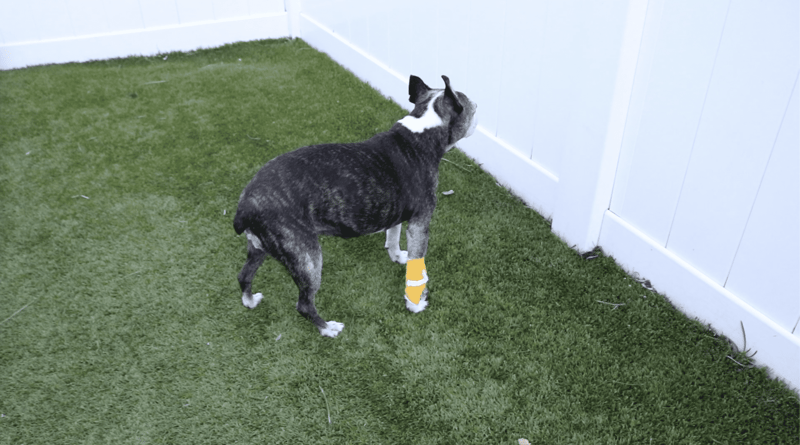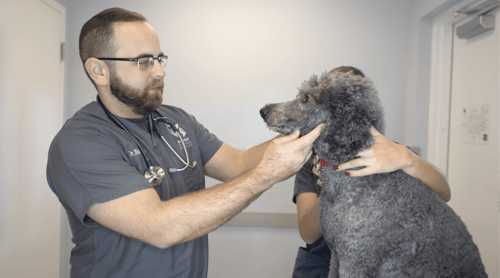4 Reasons for Sudden Behavior Change in Dogs
Your dog can’t tell you what’s wrong, but you know when something isn’t right with your “soul mutt.” You don’t need spoken words or a dog whisperer. You just know. But what is causing your dog’s change in behavior?

Dog behavior changes with age, but it is a gradual process. For example, a 2 year old dog behavior change is a common milestone, which is the age many dogs reach adulthood. Later on, some senior dogs may display irritability due to things like arthritis pain or loss of vision.
However, a sudden change in behavior is more likely due to trauma, severe pain, or possibly even a neurological issue.
What Neurological Issues Can Cause Your Dog’s Change in Behavior?
Technically, any neurological problem that causes a dog to feel unwell has the potential to cause a change in behavior in your dog.
However, when discussing dogs, there are different things one might consider “behavior,” such as habits or energy level. It should be noted that in this article, we are considering a dog’s change in behavior to be more like a change in personality. Sudden personality changes most often point to problems in the brain.
Here are four neurological disorders in dogs that cite change in behavior as a common symptom:
Brain Inflammation
In dogs, inflammation of the brain is usually autoimmune, rather than infectious. It can occur in the membranes surrounding the brain (meningitis), the brain itself (encephalitis), or a combination of the membranes and the brain (meningoencephalitis).
Other than behavior changes in dogs, symptoms of brain inflammation can include:
Chiari-Like Malformation
This genetic condition is characterized by abnormal growth of bone in the back of the skull, basically making the skull too small for the brain and restricting the flow of cerebrospinal fluid.
Symptoms of Chiari-Like Malformation besides a change in behavior can include:
- Phantom scratching
- Rubbing at the face
- Sensitivity around the back of the neck or shoulders
- Pain when active, passing stool, or simply wearing a collar
- Limb weakness or incoordination
- Scoliosis
Stroke
A stroke occurs when blood flow to part of the brain is obstructed in some way, causing damage to nerve cells.
In addition to a sudden change in behavior, symptoms of a stroke in dogs include:
- Acute onset of seizures
- Walking in circles
- Weakness on one side of the body
- Poor balance
- Blindness
Brain Tumors
Out of all the neurological problems that affect pets, especially older dogs and cats, brain tumors are one of the most common. Why these tumors occur is not easy to answer, as a combination of genetic and environmental factors contributes to cancer development.
Symptoms that your dog is suffering from a brain tumor apart from behavior changes can include:
- Compulsive circling
- Seizures
- Weakness
- Wobbliness
- Balance problems
- Blindness
Diagnosing the Reason for Your Dog’s Change in Behavior
As you can see, a dog’s change in behavior is not the only symptom that some of the conditions listed above have in common. The symptoms of some neurological conditions can look just like the symptoms of other neurological conditions. Additionally, some conditions can have a few different possible causes.
A veterinary neurologist is needed to diagnose the exact condition and pinpoint the specific cause. This is important in order to determine the best course of treatment and gauge the dog’s likelihood of recovery.

High-field MRI (Magnetic Resonance Imaging) is by far the safest and most accurate imaging tool for viewing and diagnosing your dog’s brain, while ruling out any other possible causes of your dog’s change in behavior. MRI will also show the extent of any damage and the overall severity of the condition.
What to Do if Your Dog’s Behavior Changes Suddenly
An accurate diagnosis, finding the underlying cause, supportive care, and physical rehabilitation are critical to your pet’s recovery. Therefore, if you notice a sudden change in behavior in your dog, please contact your veterinarian.
The expert veterinary neurologists at Southeast Veterinary Neurology are here for you and your pets 365 days a year. We have MRI machines at each location in Miami, Boynton Beach, Jupiter, and Virginia Beach. Contact any of our locations to schedule a consultation.